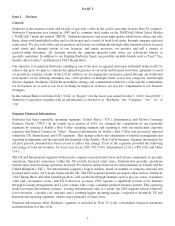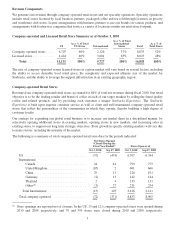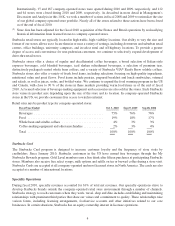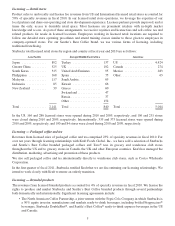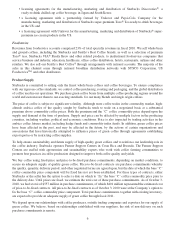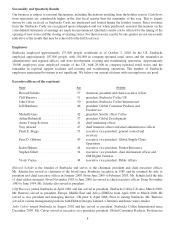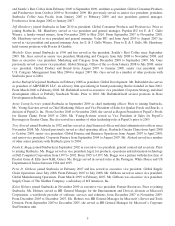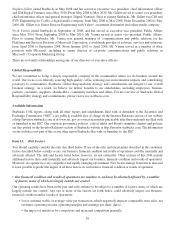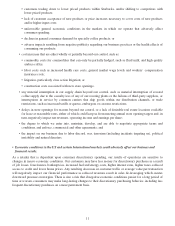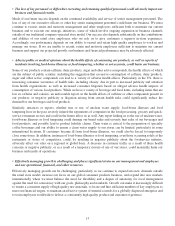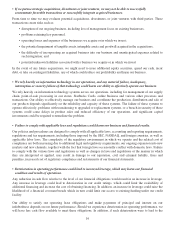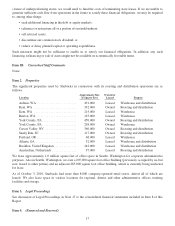Starbucks 2010 Annual Report Download - page 18
Download and view the complete annual report
Please find page 18 of the 2010 Starbucks annual report below. You can navigate through the pages in the report by either clicking on the pages listed below, or by using the keyword search tool below to find specific information within the annual report.•We may not be successful in implementing important strategic initiatives, which may have an adverse impact
on our business and financial results.
There is no assurance that we will be able to implement important strategic initiatives in accordance with our
expectations, which may result in an adverse impact on our business and financial results. These strategic initiatives
are designed to improve our results of operations and drive long-term shareholder value, and include:
• successfully leveraging Starbucks brand outside the company-operated store base, including an increased
focus on international licensed stores, Starbucks VIA®Ready Brew, and the Seattle’s Best Coffee brand;
• focusing on relevant product innovation and profitable new growth platforms;
• accelerating the growth of our global consumer products business as we transition from our licensing
relationships with Kraft Foods Global, Inc.;
• balancing disciplined global store growth while meeting target store-level unit economics in a given
market; and
• executing a multi-channel advertising and marketing campaign to effectively communicate our message
directly to Starbucks consumers and partners.
•We face intense competition in each of our channels and markets, which could lead to reduced profitability.
The specialty coffee market is intensely competitive, including with respect to product quality, service, convenience,
and price, and we face significant competition in each of our channels and markets. In the US, the ongoing focus by
large competitors in the quick-service restaurant sector on selling high-quality specialty coffee beverages could
adversely affect our sales and results of operations. Similarly, continued competition from well-established
competitors in our international markets could hinder growth and adversely affect our sales and results of operations
in those markets. Increased competition in the US packaged coffee and tea and ready-to-drink coffee beverage
markets could adversely affect the profitability of the CPG segment. (See also the discussion under “Competition” in
Item 1).
•We are highly dependent on the financial performance of our US operating segment.
Our financial performance is highly dependent on our US operating segment, which comprised approximately three-
quarters of consolidated total net revenues in fiscal 2010. Although the US segment’s operating results have
improved significantly, primarily due to our restructuring efforts (substantially completed in 2009) and to improved
revenue trends, if the operational improvements are not sustained going forward and/or the revenue trends slow or
decline, our business and financial results could be adversely affected.
•We are increasingly dependent on the success of our International operating segment in order to achieve our
growth targets.
Our future growth increasingly depends on the growth and sustained profitability of the International operating
segment. Some or all of our International market business units (“MBUs”), which we generally define by the
countries or regions in which they operate, may not be successful in their operations or in achieving expected
growth, which ultimately requires achieving consistent, stable net revenues and earnings. The performance of our
International operating segment may be adversely affected by economic downturns in one or more of our large
MBUs. In particular, our Canada, Japan and UK MBUs account for a significant portion of the net revenue and
earnings of our International operating segment and a decline in the performance of any of these MBUs could have a
material adverse impact on the results of operations of our International operating segment.
Additionally, some factors that will be critical to the success of International MBUs are different than those affecting
our US stores and licensees. Tastes naturally vary by region, and consumers in new international markets into which
we and our licensees expand may not embrace our products to the same extent as consumers in our existing markets.
Occupancy costs and store operating expenses are also sometimes higher internationally than in the US due to higher
rents for prime store locations or costs of compliance with country-specific regulatory requirements. Because many
of our International operations are in an early phase of development, operating expenses as a percentage of related
revenues are often higher compared to US operations.
12


